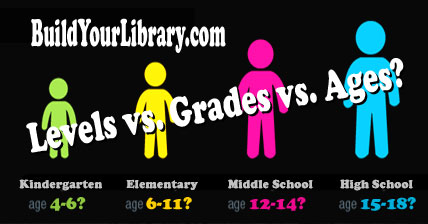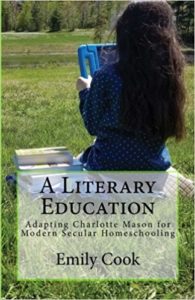Levels vs. Grades vs. Ages
December 3, 2017
 When we began writing the lesson plans for Build Your Library, we adopted the “standard” public school style naming conventions, such as Kindergarten, Grade 1, Grade 2, etc. Of course, there is no “standard” in homeschooling, but those grade levels seemed appropriate at the time. Appropriate and familiar. But then we started to get some relevant questions about the set up of our curriculum:
When we began writing the lesson plans for Build Your Library, we adopted the “standard” public school style naming conventions, such as Kindergarten, Grade 1, Grade 2, etc. Of course, there is no “standard” in homeschooling, but those grade levels seemed appropriate at the time. Appropriate and familiar. But then we started to get some relevant questions about the set up of our curriculum:
“Which grade level should I begin at with my 8-year-old?”
“My sixth-grader hasn’t studied any American history, can we start with (Level) Grade 5 or will it be too easy?”
“Will (Level) Grade 1 be too hard for my advanced 5-year-old?”
I get these and similar questions about the “grade levels” all the time. It’s probably my most frequently asked question. My usual response is that the grade levels are subjective. The material that Build Your Library covers is content-based: history, art, literature, science. These courses aren’t typically measured so much by grade as by interest. No one would pick up a copy of A Wrinkle in Time and ask themselves “What grade level is this book?” Yet when it comes to history, science, or any of those other content subjects, we tend to think in terms of grade level. Why is that?
I think we have been ingrained by society to think of education as boxes to tick off – a 6 year old is a 1st grader who must know these specific things. That is a public school model for learning. As homeschoolers, we are freed from those chains, yet we have held on to them. They are comforting. They tell us that we are on target. That our children are learning what they ought to learn.
Over the years, customers have asked me if we could change the Grades to Levels. I have been brainstorming about that for a while and I think it is finally time that Build Your Library evolves and adopts this change.
As of now, all of our full-year programs will now be designated “levels” rather than “grades”. This doesn’t change any of the actual content. But it might make it easier to choose a level to begin at when you are first starting out, or make it easier to use one level with multiple children without the oldest thinking they are doing “baby” school work.
The levels will work like this:
(BYL Level – Approximate School Grade – Recommended Age Range)
- Level 0 – Kindergarten – ages 4 – 6
- Level 1 – Grade 1 – ages 6 – 8
- Level 2 – Grade 2 – ages 7 – 9
- Level 3 – Grade 3 – ages 8 – 10
- Level 4 – Grade 4 – ages 9 – 11
- Level 5 – Grade 5 – ages 10 – 12
- Level 6 – Grade 6 – ages 11 – 13
- Level 7 – Grade 7 – ages 12 – 14
- Level 8 – Grade 8 – ages 12 – 15
- Level 9 – Grade 9 – ages 14 – 16
- Level 10 – Grade 10 – ages 15 – 17
- Level 11 – Grade 11 – ages 16 – 18
- Level 12 – Grade 12 – ages 16 – 18
I recommend when choosing a level to focus more on the age range than the grade level. If you have previously purchased a BYL Grade Level curriculum, this update is very minor and the only difference is the reference to Level vs. Grade vs. Age. You would not specifically need an updated copy of this instructor guide (like if we made changes to the booklist, schedule or other functionality) unless you want a copy that references a numeric level. Let us know and we’d be happy to send you a new copy.
Please bear with us as we update the references throughout the webpage. There may still be instances where levels, grades or age ranges may still be used interchangeably.
 Emily Cook is the author and creator of the secular homeschool curriculum Build Your Library, a literature-based K-12 program infused with the teachings of Charlotte Mason. She writes full year lesson plans as well as shorter topical unit studies. Emily has been homeschooling her four children in Southern NH for 21 years. She is passionate about reading aloud to children of all ages and loves to share her love of literature with others. She and her family also makes incredibly dorky videos about homeschooling, books and more on Youtube at ARRRGH! Schooling. You can follow her on Facebook, Twitter and Pinterest. You can also check out her author page on Amazon.
Emily Cook is the author and creator of the secular homeschool curriculum Build Your Library, a literature-based K-12 program infused with the teachings of Charlotte Mason. She writes full year lesson plans as well as shorter topical unit studies. Emily has been homeschooling her four children in Southern NH for 21 years. She is passionate about reading aloud to children of all ages and loves to share her love of literature with others. She and her family also makes incredibly dorky videos about homeschooling, books and more on Youtube at ARRRGH! Schooling. You can follow her on Facebook, Twitter and Pinterest. You can also check out her author page on Amazon.

I’m so glad you are switching to levels. My 9 year old is loving grade/level 2 but hates that the book and work pages say grade 2. It makes her feel behind her public school friends when I know she’s actually ahead of most.
I love this idea as well – I personally get caught up in the “oh no, that’s second grade and we are doing kindergarten when he should be doing the second grade!”
I too, really appreciate incorporating levels instead of grades. My 10 yr old son has had insecurity with workbooks that state grades that are lower than his “grade.” This is a great idea!